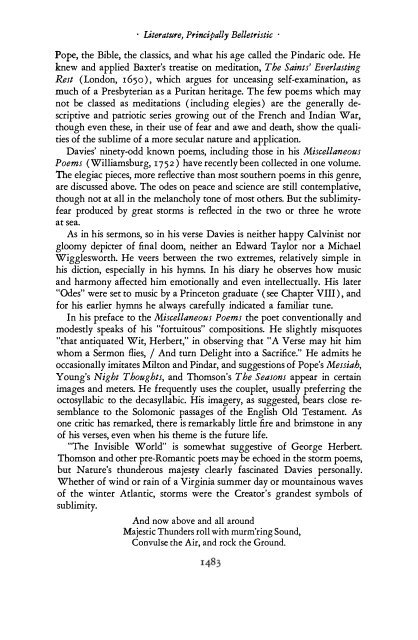Literature, Principally Belletristic - University of Tennessee, Knoxville
Literature, Principally Belletristic - University of Tennessee, Knoxville
Literature, Principally Belletristic - University of Tennessee, Knoxville
Create successful ePaper yourself
Turn your PDF publications into a flip-book with our unique Google optimized e-Paper software.
· <strong>Literature</strong>,<br />
<strong>Principally</strong> <strong>Belletristic</strong> .<br />
Pope, the Bible, the classics, and what his age called the Pindaric ode. He<br />
knew and applied Baxter's treatise on meditation, The Saints' Everlasting<br />
Rest (London, 1650), which argues for unceasing self-examination, as<br />
much <strong>of</strong> a Presbyterian as a Puritan heritage. The few poems which may<br />
not be classed as meditations (including elegies) are the generally descriptive<br />
and patriotic series growing out <strong>of</strong> the French and Indian War,<br />
though even these, in their use <strong>of</strong> fear and awe and death, show the qualities<br />
<strong>of</strong> the sublime <strong>of</strong> a more secular nature and application.<br />
Davies' ninety-odd known poems, including those in his Miscellaneous<br />
Poems (Williamsburg, 1752) have recently been collected in one volume.<br />
The elegiac pieces, more reflective than most southern poems in this genre,<br />
are discussed above. The odes on peace and science are still contemplative,<br />
though not at all in the melancholy tone <strong>of</strong> most others. But the sublimityfear<br />
produced by great storms is reflected in the two or three he wrote<br />
at sea.<br />
As in his sermons, so in his verse Davies is neither happy Calvinist nor<br />
gloomy depicter <strong>of</strong> final doom, neither an Edward Taylor nor a Michael<br />
Wigglesworth. He veers between the two extremes, relatively simple in<br />
his diction, especially in his hymns. In his diary he observes how music<br />
and harmony affected him emotionally and even intellectually. His later<br />
"Odes" were set to music by a Princeton graduate (see Chapter VIII), and<br />
for his earlier hymns he always carefully indicated a familiar tune.<br />
In his preface to the Miscellaneous Poems the poet conventionally and<br />
modestly speaks <strong>of</strong> his "fortuitous" compositions. He slightly misquotes<br />
"that antiquated Wit, Herbert," in observing that "A Verse may hit him<br />
whom a Sermon flies, / And turn Delight into a Sacrifice." He admits he<br />
occasionally imitates Milton and Pindar, and suggestions <strong>of</strong> Pope's Messiah,<br />
Young's Night Thoughts, and Thomson's The Seasons appear in certain<br />
images and meters. He frequently uses the couplet, usually preferring the<br />
octosyllabic to the decasyllabic. His imagery, as suggested, bears close resemblance<br />
to the Solomonic passages <strong>of</strong> the English Old Testament. As<br />
one critic has remarked, there is remarkably little fire and brimstone in any<br />
<strong>of</strong> his verses, even when his theme is the future life.<br />
"The Invisible World" is somewhat suggestive <strong>of</strong> George Herbert.<br />
Thomson and other pre-Romantic poets may be echoed in the storm poems,<br />
but Nature's thunderous majesty clearly fascinated Davies personally.<br />
Whether <strong>of</strong> wind or rain <strong>of</strong> a Virginia summer day or mountainous waves<br />
<strong>of</strong> the winter Atlantic, storms were the Creator's grandest symbols <strong>of</strong><br />
sublimity.<br />
And now above and all around<br />
Majestic Thunders roll with murm'ring Sound,<br />
Convulse the Air, and rock the Ground.















